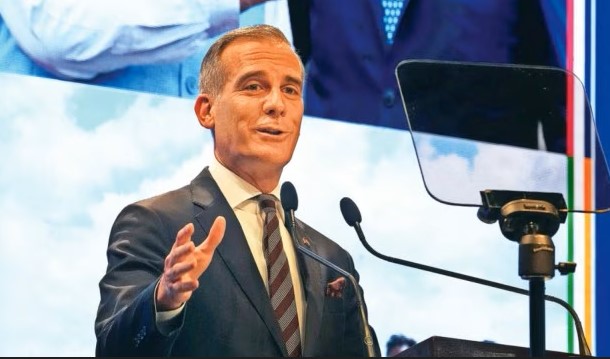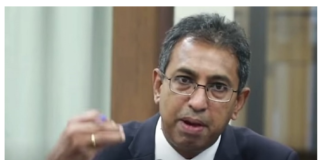US envoy Eric Garcetti’s outburst on Indo-US relations is a symptom of the cost of pursuing the national interest by exercising strategic autonomy.
By P.K.Balachandran
Colombo, July 18:
In May 2014, Narendra Modi kicked off his first term as Prime Minister of India with a grand display of his intention to seek accommodation and cooperation with all countries and end decades of strife.
The presence of the leaders of all South Asian countries at his inauguration in New Delhi was seen as the harbinger of a new era in India’s foreign policy.
Breaking protocol, Modi made an unscheduled visit to Pakistan in 2015 to demonstrate bonhomie with its Premier, Nawaz Sharif. Modi met Chinese President Xi Jinping 18 times between 2014 and 2020 to resolve nagging territorial issues.
Between 2016 and 2020, India inked landmark defence agreements with the US breaking a major taboo. These led to India’s buying US$ 25 billion worth of sophisticated hardware from the US.
But it did not take India long to give up the idea of getting along with all and opt to pursue “strategic autonomy” guided by India’s “national interest”, even if this rubbed other countries on the wrong side and earned their enmity.
The pursuit of “strategic autonomy” has actually been at the cost of the national interest.
US Ambassador Eric Garcetti’s recent fulmination about the policy’s deleterious effect on Indo-US relations is only one symptom of the losses India has suffered due to the pursuit of a distorted notion of the national interest.
New Delhi’s relationship with the US soured over issues relating to Ukraine, Russia, China and human rights. Ties with Pakistan virtually ceased following the abrogation of Art 370 of the Indian constitution that had given autonomy to Jammu and Kashmir. China and India fought over territory and Beijing’s bid to challenge India’s dominance in the South Asian region.
Curbs were put on Chinese trade and investment in India and efforts were made to prevent China from weaning away its neighbours with investments. Visits by Chinese research vessels became an issue with neighbours. India became a member of the US-led anti-China QUAD.
India defied US sanctions against Russia and bought oil from Russia at a discounted rate. When European countries criticised the purchase, Foreign Minister S.Jaishankar said that Europe could not consider its problems as the world’s problems.
Oddly, while being in QUAD, India refused to cooperate with the US on anything that might result in a military conflict with China. This put the US in a quandary.
Jaishankar refused to accept US criticisms about the human rights violations in India and described them as brazen interference in India’s internal affairs or as a colonial hangover.
Writing in Foreign Affairs in 2023, Ashley Tellis, Senior Fellow at the Carnegie Endowment for International Peace, warned: “India’s significant weaknesses compared with China, and its inescapable proximity to it, guarantee that New Delhi will never involve itself in any US confrontation with Beijing that does not directly threaten its own security.”
“India values cooperation with Washington for the tangible benefits it brings, but does not believe that it must, in turn, materially support the United States in any crisis—even one involving a common threat such as China.”
Tellis pointed out that India “does not harbour any innate allegiance toward preserving the liberal international order and retains an enduring aversion toward participating in mutual defence.”
“It seeks to acquire advanced technologies from the United States to bolster its own economic and military capabilities and thus facilitate its rise as a great power capable of balancing China independently, but it does not presume that American assistance imposes any further obligations on itself.”
Tellis also pointed out that India had consistently rejected the idea of participating in any combined military operation outside of a UN umbrella.
Garcetti’s Outburst
US disillusionment with India was publicly voiced by US Ambassador Eric Garcetti at a seminar in Kolkata earlier this month. He startled the audience when he said that US-India relations are “not yet deep enough to be taken for granted.”
Striking another blow, he said that “there is no such thing as strategic autonomy during a conflict.”
Garcetti’s outburst was triggered by Modi’s trip to Moscow and hugging Vladimir Putin on the day Russia bombed an Ukrainian hospital killing 37 people including children.
Demanding reciprocity for US defence assistance, Garcetti said: “In crisis moments we will need to know that we are trusted friends, brothers and sisters, colleagues in times of need, and the next day be acting together.”
In an oblique reference to Jaishankar’s thesis that what happens in Europe or to Europe, does not matter to people outside, Garcetti pointed out that in today’s interconnected world, “no war remains distant anymore.”
Urging India to oppose aggressor Russia, the envoy said: “We must not just stand for peace, we must take concrete actions to make sure those who don’t play by peaceful rules, that their war machines cannot continue unabated.”
Garcetti also said that there are concerns in Washington regarding civil rights violations in India. “We must actually confront and find a good way of talking them,” he said.
China and Russia
India’s relations with China got further degraded under Modi’s watch. Apart from the perpetual border conflict, India is putting a lot of curbs on Chinese investments and urging neighbouring countries not to allow Chinese investments and research vessels on grounds of security. This has rubbed India’s neighbours on the wrong side.
India feels uncomfortable in groupings like the Shanghai Corporation Organization (SCO) and in BRICS (a group comprising Brazil, Russia, India, China, South Africa) because it feels that China is trying to dominate them. There is talk in New Delhi of India’s leaving these two organizations eventually.
In their 2023 article for Project Syndicate, Arvind Subramanian (a former Economic Advisor to the Modi government) and Josh Felman said that it makes no economic sense for India to belong to BRICS as China’s GDP growth is more likely to be 3% per annum and Russia is in terminal decline.
Also, the Chinese and Russian dominated BRICS will bring India into conflict with the US, a fellow democracy. In BRICS China and Russia aspire to dethrone the US dollar as the world’s dominant currency, and to provide alternative development resources to poorer countries. But these objectives imply that a better world would be based on Renminbi dominance and Belt and Road Initiative-type lending, which will land recipient countries in debt, Subramanian and Felman warn.
They recall that India has already opted out of the China-centric Regional Comprehensive Economic Partnership (RCEP) and Belt and Road conclaves. China reciprocated when President Xi Jinping skipped the 2023 G20 summit presided over by Modi.
Writing in Nikkei Asia, Bharma Chellaney of the New Delhi-based Centre for Policy Research said that India is losing interest in the Shanghai Cooperation Organization (SCO) because China is in the driver’s seat. As President of SCO, Modi chose to convene the summit meeting online rather than in person. He skipped the SCO summit in Astana in 2024.
“Except for India, the other members of the SCO are all participants in China’s Belt and Road Initiative, which New Delhi has opposed since its launch as a neo-colonial enterprise,” Chellaney pointed out.
He recalled that China had blocked India from joining the 48-nation Nuclear Suppliers Group pending agreement that its strategic ally Pakistan be simultaneously admitted. In 2017, Beijing also made sure Pakistan was brought into the SCO alongside New Delhi.
“Seven years later it is becoming apparent that the SCO carries diminishing value for Indian foreign policy. India’s membership of the SCO, originally established as a regional security bloc, appears incongruent with its close ties with the West and its support for a free, open and democratic-led Indo-Pacific region.”
And notably, “China and Russia reject the very term Indo-Pacific, insisting that the region still be called the Asia-Pacific,” Chellaney said.
India is doggedly pursuing “strategic autonomy” in a conflict-ridden world. But it is doubtful if with strategic autonomy as the guideline, New Delhi will be able to navigate through a world where powers demand unquestioned loyalty for reciprocal support.
END



 Logging you in...
Logging you in... Loading IntenseDebate Comments...
Loading IntenseDebate Comments...

